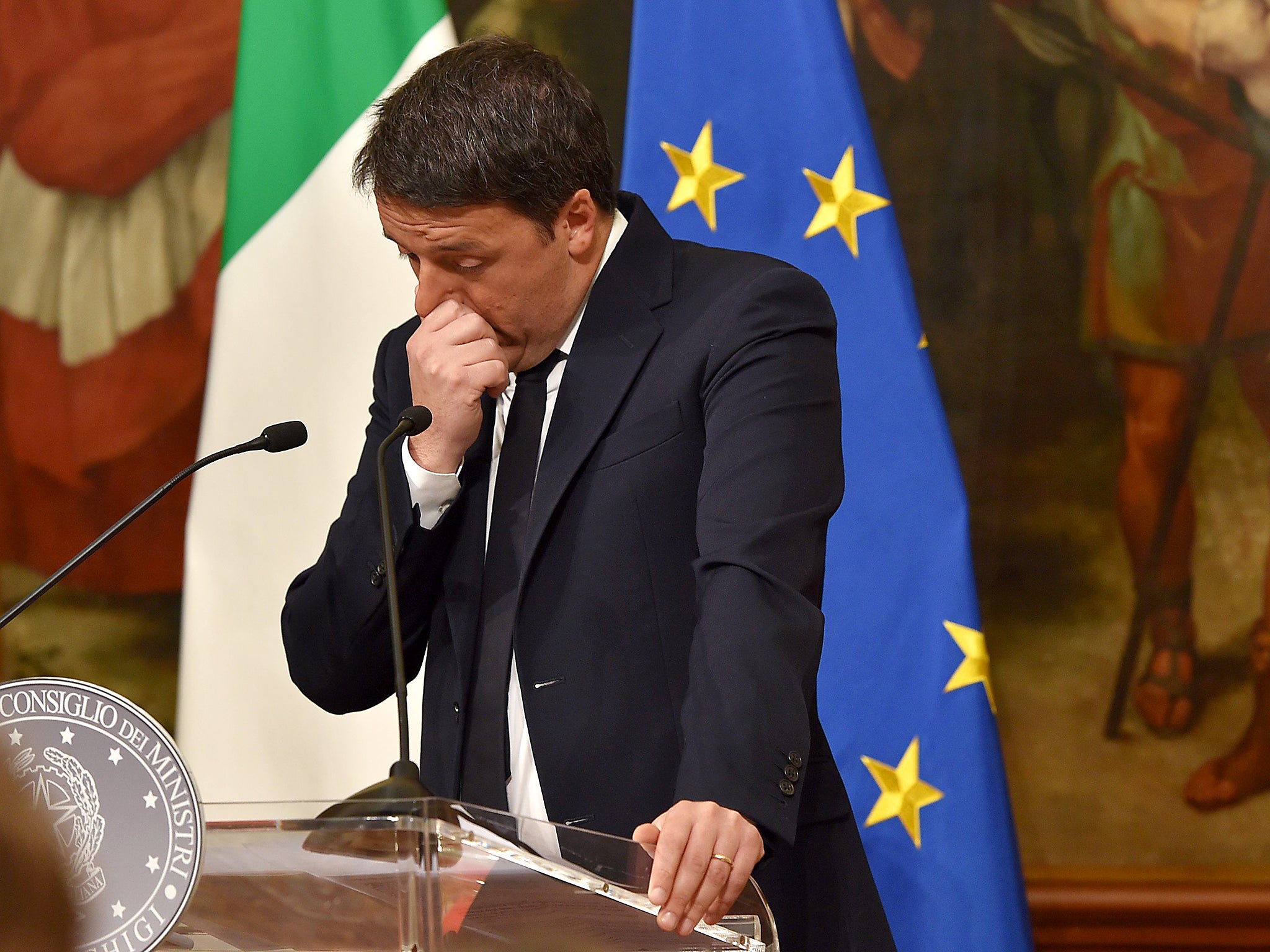What is happening in Italy? Everything you need to know about the shock referendum result
What next for Europe as Italy’s PM Matteo Renzi resigns in the wake of resounding defeat on constitutional reform?

Your support helps us to tell the story
From reproductive rights to climate change to Big Tech, The Independent is on the ground when the story is developing. Whether it's investigating the financials of Elon Musk's pro-Trump PAC or producing our latest documentary, 'The A Word', which shines a light on the American women fighting for reproductive rights, we know how important it is to parse out the facts from the messaging.
At such a critical moment in US history, we need reporters on the ground. Your donation allows us to keep sending journalists to speak to both sides of the story.
The Independent is trusted by Americans across the entire political spectrum. And unlike many other quality news outlets, we choose not to lock Americans out of our reporting and analysis with paywalls. We believe quality journalism should be available to everyone, paid for by those who can afford it.
Your support makes all the difference.Why are we asking this now?
Matteo Renzi called a referendum on reforms to Italy’s constitution, to strengthen the government and reduce the power of the upper house of parliament. Ironically perhaps, the changes were designed to increase stability and bring an end to the political merry-go-round which has seen more than 60 governments hold office in the past 70 years. Crucially, Mr Renzi announced he would resign if the Si camp lost, turning the vote into a verdict on his leadership of Italy.
Why did voters want to get rid of Renzi?
The centre-left leader of the Democrats was actually quite popular when he came to power as Italy’s youngest prime minister aged just 39 in 2014. But his labour reforms – intended to inject vigour into a sclerotic economy – provoked massive protests, while GDP growth remained sluggish, unemployment high and illegal immigration unstoppable. Opponents encouraged voters to use the referendum to express anger not only at Renzi’s rule but also at the “establishment”, the EU and the euro.
Who led the No camp?
While Si was backed by parties from the traditional mainstream of Italy’s politics, No attracted an array of insurgent groups from all parts of the political spectrum. The anti-establishment Five Star Movement of comedian Beppe Grillo was joined by the far-right Northern League, the socialist Italian Left and the nationalist Brothers of Italy. Media tycoon and former PM Silvio Berlusconi threw his Forza Italia party into the battle for a No vote.
So what happens next?
After tendering his resignation to President Sergio Mattarella, Renzi remains in office until a successor is appointed. Opposition groups, including the Five Star Movement, are pushing for an early election. But it is thought more likely that Mattarella will ask another senior Democrat to lead a caretaker administration until scheduled polls in the spring of 2018. Finance minister Pier Carlo Padoan is favourite to take over. Changes of government without elections are not unusual in Italy, and Renzi himself took power without a public vote by forcing out predecessor Enrico Letta.
What does this mean for the EU?
Europe has taken changes of government in Rome in its stride in the past, but Renzi’s fall comes at a moment of massive instability for the continent, which was already reeling from long-running crises over migration and the single currency when it was delivered a body-blow by the UK’s Brexit vote. Anti-EU campaigners are already agitating for the country to follow Britain’s lead, with French Front National leader Marine le Pen declaring that the Italian people had “disavowed the EU”. But, while Eurosceptic, neither Five Star nor the Northern League have so far advocated withdrawal, so in the short term at least, Italexit – or Quitaly – looks unlikely.
What about the euro?
Turmoil in the single currency zone’s third biggest economy had an immediate impact on the euro, which tumbled to $1.05 in the wake of Mr Renzi’s announcement of his resignation. Many Italians blame their slow emergence from the 2008 economic crisis on membership of the single currency, and Five Star has been calling for a referendum on a return to the lira. Commentators are keeping a close eye on Italy's banks, many of which are burdened by bad debt and may struggle to find refinancing during a period of political uncertainty.
Is it just Italy?
No – 2017 will see a string of elections across the EU in which populist movements are hoping to shake the established parties. French President Francois Hollande has already said he will not stand in an election in the spring, which is expected to pit the far-right Ms le Pen against the Thatcherite Francois Fillon. The right-wing populist Freedom Party of Geert Wilders is leading polls ahead of the Dutch parliamentary elections in March, and even Germany’s Angela Merkel is facing an upsurge in support for the anti-immigration Alternative for Germany as she seeks re-election in the autumn. By this time next year it looks likely that Merkel will be one of only a handful of EU leaders left standing out of those who ruled the roost at the start of 2016. And with Donald Trump replacing Barack Obama in the US, the Western world will have undergone a virtually unprecedented shake-up in its highest political ranks.
Are there any exceptions from the tide of populism?
As Italy was voting No, neighbouring Austria rejected the Eurosceptic candidate of the right-wing Freedom Party, Norbert Hofer, in re-run presidential elections. But the EU-backing new president Alexander Van der Bellen is hardly any more of an “establishment” figure, as Europe's first nationally-elected head of state from a Green Party.
PA
Join our commenting forum
Join thought-provoking conversations, follow other Independent readers and see their replies
Comments